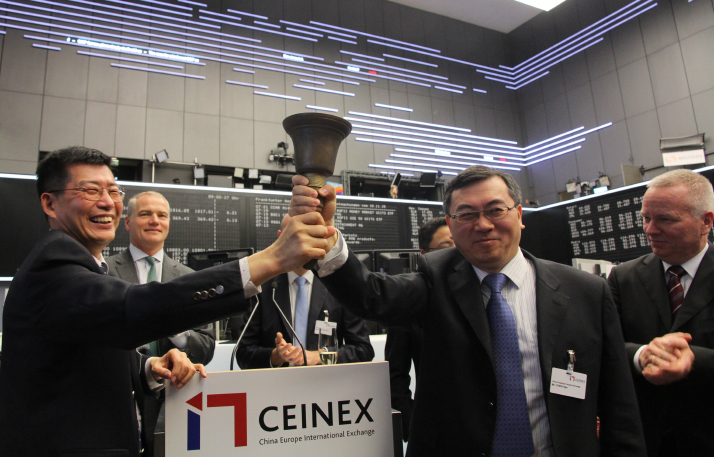| Business |
| Creating a Bond | |
| Chinese bonds' inclusion in flagship global index boosts faith in the economy | |
|
|
 A forum marks the first anniversary of the mainland-Hong Kong bond connect program in Hong Kong on July 3, 2018 (XINHUA)
From April, Chinese bonds will be included in the U.S. Bloomberg Barclays bond index, China's central bank confirmed. The Bloomberg Barclays Global Aggregate Index, one of the three most widely used bond indices in the world, announced last year that it would add renminbi-denominated government and policy bank securities over a 20-month period. "The formal inclusion of Chinese bonds in major global bond indices fully demonstrates the confidence of international investors in the Chinese economy, and reflects the new progress achieved in the opening up of China's financial markets, which will be helpful to better satisfying the demand of international investors for renminbi asset allocation," the People's Bank of China (PBC) said in a statement on January 31. The central bank said it would work with the agencies concerned to improve relevant rules and regulations and enhance the opening up of the domestic bond market to create a friendlier and more convenient investment environment for international investors. Laying the ground In March 2018, international financial information provider Bloomberg announced that it would add Chinese bonds after additional enhancements were carried out by the PBC and the Ministry of Finance to increase investor confidence and improve market accessibility. In the second half of 2018, in preparation for the inclusion, the Chinese authorities completed the delivery versus payment settlement procedure—a common settlement method in which cash payments have to be paid before or at the same time the securities are delivered—for the mainland-Hong Kong bond connect program. Through this program, which was launched in 2017, qualified overseas investors can invest in the Chinese mainland interbank bond market. They also offered a three-year tax exemption period for overseas investors, according to a press release by the National Association of Financial Market Institutional Investors on January 17. Bloomberg said when fully accounted for in the index, yuan-denominated Chinese bonds would be the fourth largest currency component following the U.S. dollar, euro and yen. As per data by January 24, the index was to include 363 Chinese securities, accounting for 6.03 percent of the $54.07-trillion index. The inclusion represents an important milestone on China's path toward more open and transparent capital markets, said Bloomberg Chairman Peter T. Grauer, adding that it also underscores Bloomberg's long-term commitment to connecting investors to China. "With the upcoming inclusion of China to the Global Aggregate Index, China's bond market presents a growing opportunity for global investors," he said. In addition to the Global Aggregate Index, yuan-denominated debt will be eligible for inclusion in Bloomberg's Global Treasury and EM Local Currency Government Indices starting April.  Executives ring a bell to inaugurate the China Europe International Exchange, a dedicated trading venue for China- and renminbi-related investment products, in Frankfurt, Germany, in November 2015 (XINHUA)
A milestone The Chinese bond market has been opening up progressively to the outside world in recent years. According to PBC figures, by the end of 2018, the outstanding bonds in China's bond market totaled 86 trillion yuan ($12.68 trillion). International investors held nearly 1.8 trillion yuan ($265.49 billion) of it, up 46 percent year on year. In 2018, the Chinese bond market saw net foreign capital inflow of $100 billion, accounting for 80 percent of the total foreign capital inflows into emerging markets, PBC Deputy Governor Pan Gongsheng said. This indicated foreign investors' strong desire to purchase yuan-denominated assets, he pointed out. He also said Chinese bonds' inclusion in major international bond indices demonstrates international investors' confidence in the Chinese economy and their recognition of the opening up of the Chinese bond market. The Bloomberg Barclays inclusion will be conducive to improving international investors' asset allocations and advancing the opening up of China's financial market. According to He Nanye, a research fellow with the Suning Institute of Finance, the inclusion of Chinese bonds in the index will enhance their popularity. They will attract more international investors, thus helping increase the liquidity of the Chinese bond market and facilitate the development of domestic corporations. "The inclusion is a confirmation of the achievements of the Chinese bond market in recent years, indicating that it is better developed and increasingly recognized by the international market," He said. "This will also help diversify the sources of investors for Chinese bonds and attract more international investors to buy yuan-denominated bonds." Zhao Yayun, a research fellow with the CITIC Foundation for Reform and Development Studies, said though Bloomberg had made the announcement last year, the confirmation of the inclusion during the time of Sino-U.S. trade talks is good news for China's capital market. It indicates that the financial sector of the West is recognizing the economic growth and credit of China, and in the future, a large amount of international capital will buy Chinese bonds. The inclusion demonstrates that the influence of Chinese bonds has remarkably improved, Liu Xiangdong, an associate researcher with the China Center for International Economic Exchanges, said. More overseas investors will put Chinese bonds into their investment baskets, making China's bond market more international. But inclusion in major international indices is merely one of the steps for the opening up of the Chinese bond market, which still has a long way to go in terms of liquidity, risk hedging and widening the types of products, the PBC's Pan cautioned. To further open up the bond market, China needs to still improve related arrangements to promote bond market connectivity and better meet overseas investors' demand. Copyedited by Sudeshna Sarkar Comments to wangjun@bjreview.com |
|
||||||||||||||||||||||||||||
|